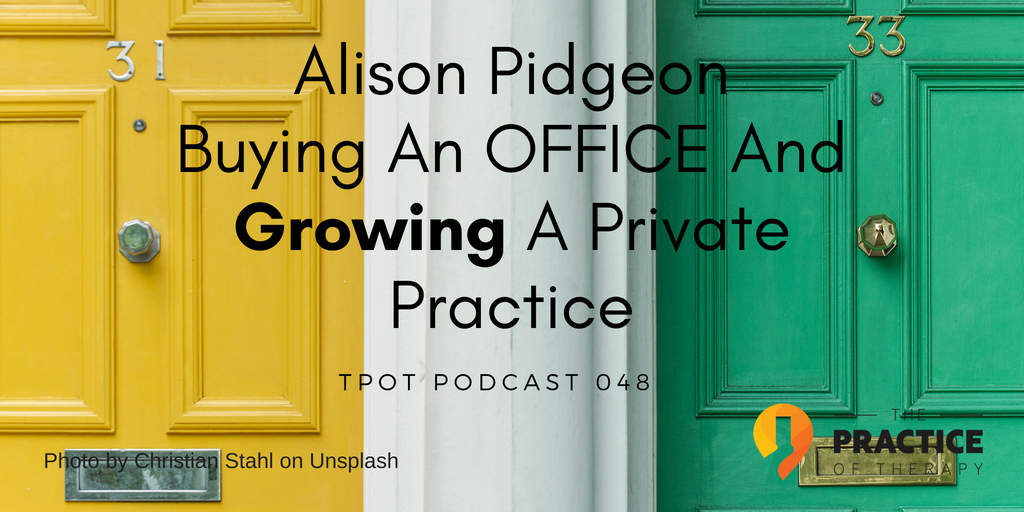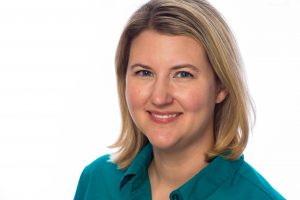
In this episode of the Practice of Therapy Podcast, Gordon talks with Alison Pidgeon, LPC about growing your private practice by diversifying your income. Alison and Gordon talk about what they have learned about growing private practices and then getting to the place where they both bought their own buildings. They also talk about some of the ways in which group practices can be formed and why they have chosen the business models they are using in their practices. Alison and Gordon talk about some of the things they have learned “the hard way” and what how they might have done differently in those beginning stages of their private practices.
Meet Alison Pidgeon
 Alison Pidgeon, MA, LPC, is a licensed professional counselor and the owner of Move Forward Counseling (www.moveforwardlancaster.com) in Lancaster, PA. Her private practice, which focuses on women’s issues, currently consists of six other therapists and two assistants. Alison has recently purchased an office building to house her private practice and will be expanding to a total of 12 therapists in the fall of 2018.
Alison Pidgeon, MA, LPC, is a licensed professional counselor and the owner of Move Forward Counseling (www.moveforwardlancaster.com) in Lancaster, PA. Her private practice, which focuses on women’s issues, currently consists of six other therapists and two assistants. Alison has recently purchased an office building to house her private practice and will be expanding to a total of 12 therapists in the fall of 2018.
In addition, for the past two years, Alison has been working as a business consultant along with Joe Sanok, from Practice of the Practice, (http://www.practiceofthepractice.com/our-services/consulting-with-alison/) for other private practice owners. She loves being an entrepreneur and helping others achieve their dream of being their own boss. Alison’s specialty as a consultant is how to have an insurance-based practice, helping those who are just starting out and how to grow from a solo to a group practice.
Alison has garnered local media attention for her private practice on TV, radio and in print. She has been a featured guest on the Practice of the Practice podcast, Selling the Couch podcast, and The Therapist Experience podcast. In 2017 Move Forward Counseling won the “Emerging Business of the Year” Award from the Central Penn Business Journal.
Buying a Building
One of the big steps that Alison and Gordon talked about was the step they both took in buying an office space. For many therapists and counselors, this step seems very intimidating. But if you think about it, it is really not that much different from buying a house and there are usually more financing options for commercial property. Especially if you are willing to work with private investors. It’s all a matter of doing the research and looking at options.
Owning your private practice space, many times actually ends up being much more cost effective when you run the numbers. Alison gave the example of a non-profit she is involved with. When they ran the numbers, they realized they had paid double what the building was worth through leasing it.
Passive Income and Diversifying Income Streams
One of the things that helps solidify growth in your practice comes from diversifying your streams of income. There are a lot of ways to do this. One is to create other less traditional products or services to offer clients. Groups, workbooks, seminars, and supervision are just a few.
Another great way to create “passive income” is to add other counselors and therapists to form a group practice. What this does, of course, is allow the practice owner to reap the benefits and income from the efforts of others in exchange for providing a place for them to practice.
Thinking Long-Term
One of the “wish I had known…” issues that Alison mentioned, was she wish she had thought more long-term when she first started her private practice. She would have spent more time thinking about growth and what that would look like. Especially in terms of adding other counselors. She also realized that she should have thought about what her practice would look like 3-5 years down the road.
Insurance vs. Self-Pay
One of the ongoing debates in the private practice space is if a practice should get on insurance panels or be strictly private pay. For Alison and Gordon, they do a combination of the two. Alison talked about really understanding your “break even” point in terms of how much you need to be reimbursed to cover your practice’s overhead and expenses. She only stays on the panels that meet or exceed this criteria.
The other factor to consider when thinking about being on insurance panels or not, is knowing the demographics of your area and what people can generally afford. Typically, rural areas are more insurance dependent and a clinician needs to accept insurance in order to get the volume of clients they need to sustain their practice.
Group Practices and Their Structure
Alison and Gordon talk about some of the ongoing discussions they have had in their mastermind groups around having group practices. In particular, whether to follow a “1099 Contractor” model or a “W2 Employee” model. Ultimately, it is an individual decision based on the practice owner’s preferences and how much oversight they want to have with their therapists.
Other factors around this issue depend on state laws and what sort of corporate structure the practice has. In addition, the benefits and “perks” the practice owner wants to provide their employees.
There are any number of ways to set this up, from doing a “fee split” to a flat rate per case or giving a salary or hourly wage. Again, how it is set up depends solely on individual preferences and business structure.
Starting a Group vs. Working in a Group
For many clinicians, the idea of being in private practice is very intriguing. But for some, the idea of running a business is not that appealing. For these folks, joining a group practice really makes more sense. But for those people that have a bit of an “entrepreneurial spirit” and enjoy the logistics of running a business, becoming a group owner makes more sense.
Systems and Processes to Help You Grow
One important piece of being able to have sustainable growth in a private practice is to have the systems and processes in place to support this. Alison talks about the importance of documenting your processes and having set systems that help you operate more on “auto-pilot” with your practice.
Alison talks about the importance of being able to also collect data about your systems and processes. For example, knowing how well your intake processes are working and the ability to retain clients and get new clients to actually book appointments. Other processes to focus on are with your onboarding processes for new therapists and making that as seamless as possible.
The other very integral part of private practice systems and processes are having a reliable EHR system or other system (like Google G-Suite) that works well for you in your practice. Most EHR’s are able to track data and give the reports you need to see how your practice is growing.
Getting the Help You Need
Finally, one of the things that always is a great ROI (return on investment) for most people in private practice is in doing some consulting and/or coaching with someone. Alison and Gordon talk about the benefits and huge return they have gotten by being part of and also leading mastermind groups. It is a way to be with like-minded people that all have common goals for their practices. It’s usually the boost people need to take their practices to the next level.
Resources and Contact Information
Email Alison: alison@practiceofthepractice.com
Alison’s Mastermind Group with Joe Sanok
Gordon’s Mastermind Group (Starts September 7th 2018!)
Check out these books from next week’s podcast guest, Mike Michalowicz
[amazon_link asins=’073521414X,0525534016,1591844886′ template=’ProductGrid’ store=’POT Sales’ marketplace=’US’ link_id=’0e6a8d57-aad5-11e8-9de3-81de9adf4a7f’]
Meet Gordon Brewer, MEd, LMFT
Gordon is the person behind The Practice of Therapy Podcast & Blog.He is also President and Founder of Kingsport Counseling Associates, PLLC. He is a therapist, consultant, business mentor, trainer and writer. PLEASE Subscribe to The Practice of Therapy Podcast on iTunes, Stitcher and Google Play. Follow us on Twitter @therapistlearn and Pinterest “Like” us on Facebook.

